pre-, prae-
(Latin: before [both in time and place])
The prefix prae- can actually be substituted for pre- because both of them are different spellings for the same prefix meaning "before".
2. To cause a liquid or solid forms of water, condensed in the atmosphere, to fall to the ground: Excess moisture in the sky is precipitated as rain, snow, or hail, depending on the season of the year.
3. To throw someone or something from a great height, or to fall from a great height: Jack dropped a stone from the bridge high above the river and it precipitated down into the swirling roar below.
4. To cause a substance in a solution to settle down into solid particles: A chemical sediment occurs when certain substances are precipitated by an inorganic or organic process.
5. To occur with undue rapidity: The steep rise in prices for gas precipitated street rioting.
6. Etymology: from Latin praeceps, praecipitis, "headlong, steep"; from prae-, "before, forth" + caput, "head".
2. Referring to a situation or event occurring with haste or speed: Linda had to make more precipitate choices for the rest of her final exam at school because there was only five minutes more to complete it.
3. Etymology: from Latin praecipitatus, "hurl headlong, fall, be hasty" from praeceps, "headlong"; prae-, "forth, before" + caput, "head".
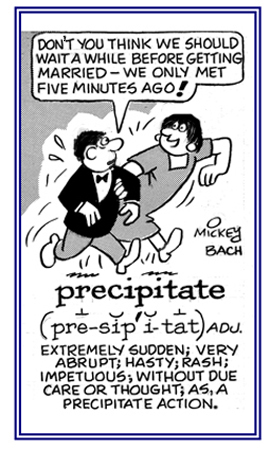
Go to this Word A Day Revisited Index
so you can see more of Mickey Bach's cartoons.
2. A casting down or falling headlong: Little Tommy tumbled down from the top step of the long staircase and this precipitation terrified and alarmed his parents greatly!
3. A hastening or hurrying in movement, procedure, or action: Jack's friends were convinced that he was responsible for the precipitation of his death because of his addiction to alcoholic beverages.
4. Sudden haste: The precipitation Janet showed by leaving so abruptly and without saying goodbye took all of her friends by complete surprise.
5. Unwise or rash rapidity: The burglar's precipitation from the house was completely foolish because he was immediately caught right outside before he could flee!
6. In meteorology, falling products of condensation in the atmosphere, such as snow or hail: When the weather forecast predicted a high level of precipitation, people had to expect a lot of rain.
7. The amount of snow, hail, etc., that has fallen at a given place within a given period, usually expressed in inches or centimeters of water: Ivy went outside to check the device that showed the precipitation of rain the night before.
8. In chemistry and physics, the separation of a solid substance from a solution: In precipitation, crystals assume a dense form when a point of total saturation has been attained.
9. Etymology: "sudden haste", from Middle French precipitation (15th century); directly from Latin praecipitationem, praecipitatio, "act" or "fact of falling headlong, haste, steep place"; from praecipitare, "to throw headlong, to fall, to be hasty"; from praeceps "headlong, steep"; which was a compound formed from the prefix prae-, "in front" + capit, caput, "head".
2. Etymology: "abrupt, hasty"; later, "rushing headlong; probably formed partly in English from Latin praecipitium, "precipice" meaning "steep, headlong, headfirst"+ English -ous, "characterized by".
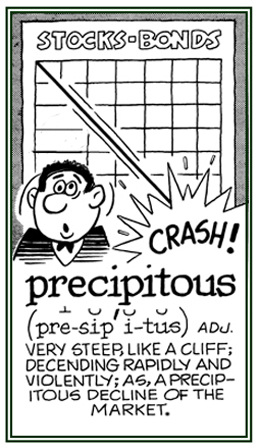
Go to this Word A Day Revisited Index
so you can see more of Mickey Bach's cartoons.
2. Pertaining to something which occurs very suddenly and to a great degree: If a reduction or increase in stocks on the stock market happens precipitously, it happens extremely fast.
Monroe presented a précis of his book's plot to the audience.
2. Etymology: from prae, "before" and caedere, "to cut".
2. A reference to someone who is very careful about small details; concerning something which is proper, correct, and faultless: Tim's mother is teaching him precise examples of correct behavior.
3. Denoting that something is the exact one that is being referred to: At that precise moment, it started to thunder and rain just as the weather forecaster had indicated on TV.
4. Descriptive of something that is distinct and correct, such as a talk or discussion: Henry is a very precise speaker when he is presenting the procedures that are necessary for a profitable income for his company to his fellow employees.
5. Etymology: from Latin praecis-, "cut short"; from prae-, "in advance" + caedere, "to cut."
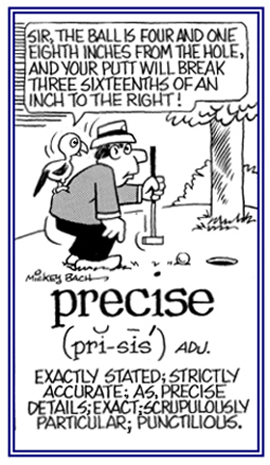
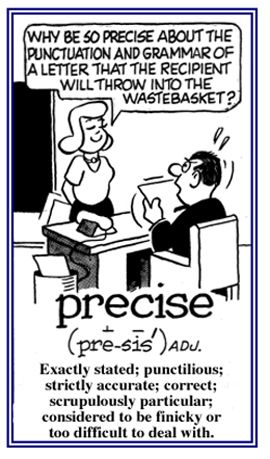
Go to this Word A Day Revisited Index
so you can see more of Mickey Bach's cartoons.
3. Concerning how something is communicated in complete and accurate detail: John told his friend precisely with all the particulars what had happened when the thunder storm came the night before.
4. Clearly and distinctly: Shirley always speaks very precisely when she teaches her students about writing their compositions.
5. Descriptive of how something important or obvious is emphasised: Little children love to go to playgrounds precisely to have have fun using the equipment and playing ball with their friends.
6. Conveying how something is in complete agreement with what has been said: Kay is precisely correct when she says that the repairmen can't be relied on to finish the job on time.
2. The condition of being reproduced accurately in amount or performance: Sam handled it with the preciseness of an expert as shown by the meticulousness of his work.
2. In mathematics, the correctness to which a calculation is performed, specifying the number of significant digits with which the result is expressed: The engineer checked the precision of the measurements of his sensitive equipment to make sure it was still reliable.
3.The requirement of great exactitude: Being a TV news reporter necessitates perfect precision to be at the right spot at a specific time for a broadcast.
4. Perfect accuracy and correctness when performing business dealings: Bank clerks have to show great precision when they take care of the accounts of their clients.
2. A person who is a purist, particularly with using the correct use of words: Being a precisionist, Carol was a perfectionist when composing letters and paid much attention to the formal rules of grammar and appropriate vocabulary.
The results of preclinical examinations may include new medical devices, drugs, gene therapy solutions, and diagnostic tools.
2. To prevent the presence, existence, or occurrence of: The judge stated that insufficiency of the evidence precludes a conviction of the defendant.
Ted's physical disability precludes an athletic career for him.
Before going on their vacation, Terry's father decided to have the car checked in order to preclude any possible breakdown while they were traveling.
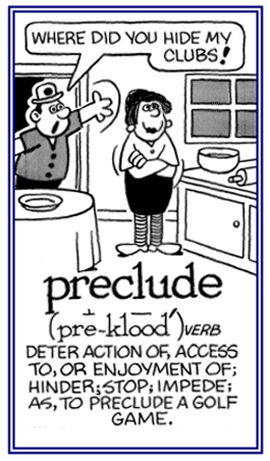
Go to this Word A Day Revisited Index
so you can see more of Mickey Bach's cartoons.
Related before-word units: ante-; antero-; anti-; pro-.
Related "time" units: aevum, evum; archaeo-, archeo-; Calendars; chrono-; horo-; Quotes: Time; tempo-.


